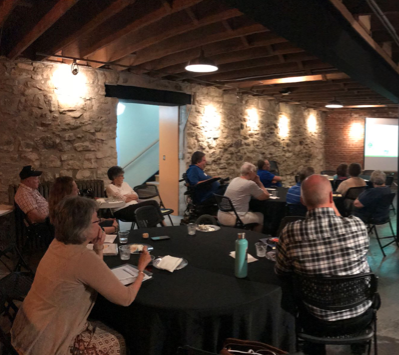
Local/Regional Organizations who presented included: Northwest Kansas Economic Innovation Center, Western Prairie Food Farm and Community Alliance, Kansas Appleseed, Kansas League of Women Voters and Kansas Rural Center.
The speakers and organizations fielded questions from attendees covering Supplemental Nutrition Assistance Program (SNAP) benefit recipient requirements, self-sufficiency education (e.g. cooking, gardening, food preservation classes), upcoming technology development opportunities, the need for more open communities, and collaborative regional partnerships. These topics surfaced through an open dialogue session highlighting local and regional needs and concerns.
One of the projects presented during the evening included an alternative model for produce distribution. Northwest Kansas Economic Innovation Center (NKEICI) started the research project through a HERO grant funded by the Sunflower Foundation, and included surveys of regional growers, grocers, and distributors in a 26- county region. As a result of the research, Scott Sproul of NKEICI initiated ongoing collaborative discussions with regional distributors in solving transportation challenges for growers and grocers. “There are great opportunities for northwest Kansas and an especially great opportunity for the High Plains Food Coop to grow,” noted Scott Sproul.
This event was the first in a series of evening “town halls” that KRC is hosting around the state to provide information and analysis on federal and state level food and farm policy and programs. Within the broader context of state budget and revenue issues and the need for greater citizen engagement, the town halls focus on local and regional level efforts to strengthen community access to food, resources for farmers, healthcare, and education. A round table dialogue at each meeting reaches deeper into the issues and highlights how to get involved or take action.
These forums are part of KRC’s “Community Food Solutions for a Healthier Kansas” initiative and Integrated Voter Engagement project, working toward better incorporating Kansas farms and communities into the state’s healthy food supply chain. Individuals and organizations attending are encouraged to continue to share information, and reach out to their neighbors and other citizens to work on local and regional issues and encourage grassroots engagement.
The mission of KRC, founded in 1979, is to promote the long-term health of the land and its people through community-based research, education, and advocacy that advances an economically viable, ecologically sound, and socially just food and farming system in Kansas. For more information, visit kansasruralcenter.org.
— Kansas Rural Center
